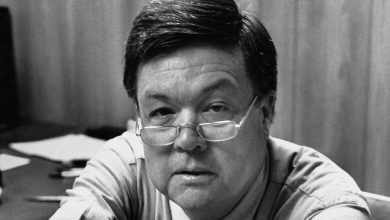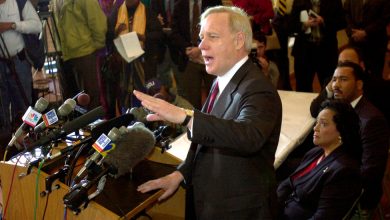A ‘NATO Nerd’ Thrown Into the Crisis Over Russia and Ukraine

BRUSSELS — After battles with Senate confirmation and Covid, Julianne Smith has finally arrived in Brussels as America’s ambassador to NATO in the midst of the deepening crisis between Russia and the alliance over the future shape of European security.
The post of ambassador to the 30-nation alliance, one of the most important in the American system, had been empty for almost a year, and hands-on American leadership was widely considered to have been missing in NATO during crises like the messy exit from Afghanistan and the controversy over the Australian decision to dump a contract for French submarines in favor of an Anglo-American option.
Now comes the most serious crisis to face the Western alliance since the Cold War. Russia has gathered more than 100,000 troops on the borders of Ukraine. Though Ukraine is not a NATO member, the threat of deeper Russian intervention in the county has set off intense rounds of diplomacy and a shuffling of some forces and frigates by NATO members.
It’s amounted to quite an introduction to her new post for Ms. Smith, 53, known as Julie. But she arrives well-prepared as a self-described “NATO nerd” and a close longtime aide to President Biden and Secretary of State Antony J. Blinken. When Mr. Biden was vice president, Mr. Blinken was his national security adviser and Ms. Smith was the deputy.
The standoff has pushed alliance members together even as it has highlighted their lingering divisions and reminded them of the importance of the United States to Europe’s security, after some have talked about “autonomy” in recent years.
“It’s hard enough to get 30 people to agree on a restaurant,” Ms. Smith likes to say about NATO. “So it has its challenges.” Still, it’s easier when one ally, like the United States, is so much bigger and richer and pays a large part of the bill.
The crisis over Russia and Ukraine has been an aid to unity, Ms. Smith acknowledged, bringing NATO back to basics, to “the core purpose of this alliance,” which was “to protect us from the Soviets,” she said.
“Intuitively, NATO allies understand what needs to be done, they understand the importance of cohesion and resolve, they understand the importance of preparing for all contingencies,” she said. “They’re also deeply familiar with the Russian playbook. This is not new territory.”
Russian arguments, complaints and concerns are also familiar, she said. “When it comes to Russia, fundamentally, I think in our bones, we have a sense of what we’re up against.”
That may be reassuring to America’s NATO allies. Ms. Smith knows Mr. Biden and his aides very well, and her new NATO colleagues know she can reach out to the top of the American system if she needs to.
And she should be up to speed — while waiting months for Republican senators to allow her confirmation to go forward, she worked with Mr. Blinken at the State Department as a special adviser on NATO and European issues.
“I’ve been drawn to this alliance for so long,” she said in an interview at the American ambassador’s residence, Truman Hall, while she waits for her personal shipment to arrive. “I’ve looked at it and studied it and worked on it and with it when I was at the Pentagon, when I was at the White House, and then at State Department for the last year.”
NATO unity is much talked about, though difficult to achieve. That’s especially true with a new German government that is a three-party coalition, and a Germany that economically has both the most power in Europe and the most to lose from harsh sanctions on Russia.
But Ms. Smith also benefits from an alliance that feels it dodged a bullet under President Donald J. Trump, who questioned its purpose, criticized its budget and even its building and mused openly about abandoning it. There is considerable good will for Mr. Biden, she said.
Despite Mr. Trump, Congress has remained deeply supportive of the alliance, Ms. Smith said, one area of lasting bipartisanship. One of her goals is to prevent NATO from becoming a partisan issue. “I want to ensure that both Democrats and Republicans remain involved and excited about what this alliance is doing,” she said.
Ms. Smith is only the third woman to hold this post, after her predecessor, Kay Bailey Hutchison, the former Texas senator, whom she praised as “quite remarkable” in her management of the Trump years, and Victoria J. Nuland, a career diplomat who was NATO ambassador under President George W. Bush and who is now under secretary of state for political affairs, one of the State Department’s top jobs.
Being a woman in this job matters, Ms. Smith said, pointing to other high-ranking women in the Biden foreign-policy team, including most of her interagency counterparts. Two years ago, out of office, Ms. Smith was a co-founder of the Leadership Council for Women in National Security, to promote “gender diversity” in what traditionally has been a male-dominated field.
“We’re finding our way, we build networks, we support each other,” she said. “But boy, we still have a lot of challenges,” she said, including how to lessen the number of women who opt out in midcareer for reasons ranging from the need for family time to discrimination and sexual harassment.
In her own career, she said, “I’ve had moments where I walk in and someone says, ‘Could you get me a coffee?’ and you’re there to deliver a keynote and that’s a common issue, you know, women trade some of the stories.” She described more of the challenges in a widely read 2017 guest essay in The New York Times.
There are now seven women among the 30 NATO ambassadors, she said. Muriel Domenach, the French ambassador, met Ms. Smith, then at the Pentagon, in 2008, and admires her.
“If one person can help NATO recover from the PTSD syndrome from Trump, it’s her,” Ms. Domenach said. “She is the right person, long awaited, coming at time of crisis, which is so hard, but she is empowered.”
Ms. Smith is already making inroads to better consultation with allies, which is the key to U.S. leadership in the alliance, Ms. Domenach said.
“She represents the enduring commitment of Washington to NATO and to the principles of an alliance, however difficult that is,” Ms. Domenach said. “The moment is very challenging, and it’s not an easy thing to show the right balance of leadership and consultation, and she has both.”
However long in the planning, the move to Brussels has hardly been easy, Ms. Smith said, with a husband, David Black, two sons, Liam, 11, and Dylan, 7, and Scout the dog.
After she was finally confirmed, Covid got in the way. It was already bizarre, she said, to be working from home and unable to travel.
“I would literally be speaking to Joe Biden and my son’s, like, walking behind me. I mean, it was a very weird world, particularly as working parents, just weird things would happen.”
And then, she said, there was “the delight that is moving a family during the Christmas holiday.” She grew up in Michigan and wanted to say goodbye to her family — parents, sister, nephews, cousins, aunts and uncles. So they flew there and got the lieutenant governor of Michigan, Garlin Gilchrist II, to swear her in ceremonially in front of the family.
“And then on Christmas morning my kids woke up and said they were not feeling good.” They tested positive, so the family immediately drove back to Washington, staying in a hotel Christmas night. They made the best of it with a soup-and-sandwich dinner at a chain restaurant. “We were laughing. But there was no one on the road. It was really bleak.”
The day they were going to sell the car, another driver hit and totaled it. And then the day before they were going to fly, Liam still tested positive for Covid. “So we went to Dulles in two vehicles with the dog, with eight suitcases, with a positive child. He also got carsick on the way to the airport. I’ll spare you all the details,” she said, laughing.
“It was a nail biter,” she said, adding, diplomatically: “But we made it, and everyone is happy to be here.”




